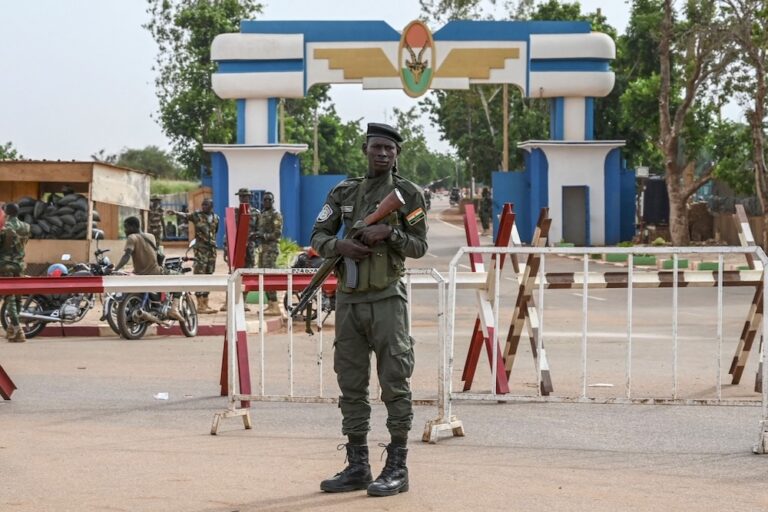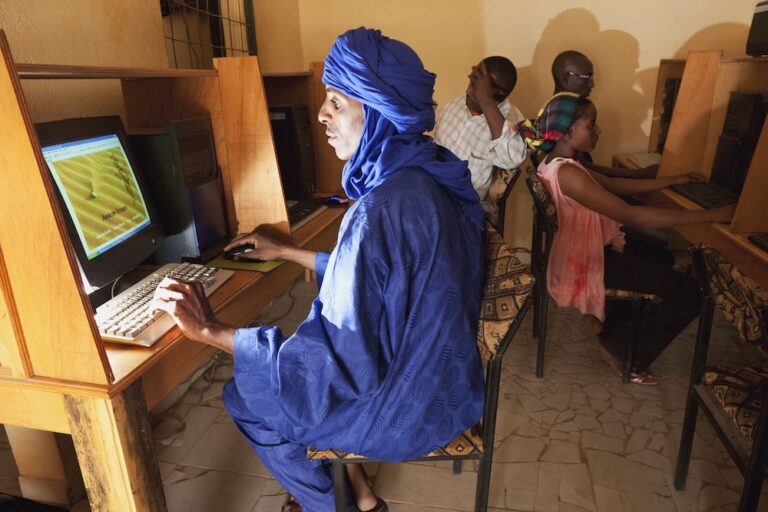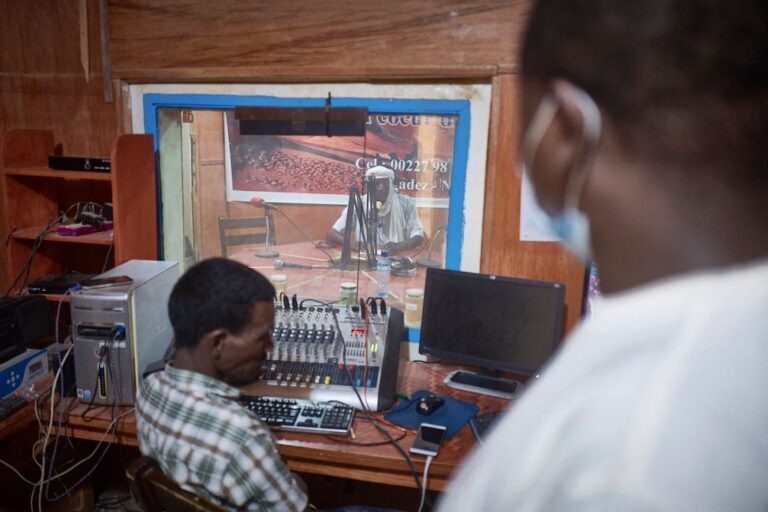The vast majority of African nations continue to jail journalists and close media houses on charges of defamation or for "insulting" authorities or their policies. The practice prevents legitimate public discourse and critical writing and leads to self-censorship.
UPDATE: IPI welcomes Liberia’s move to decriminalise defamation (IPI, 11 May 2012)
(WAN-IFRA/IFEX) – Niamey, Niger, 30 November 2011 – The President of Niger, Mahamadou Issoufou, has become the first head of state to endorse the Declaration of Table Mountain, which calls for repeal of criminal defamation and ‘insult’ laws and for putting press freedom higher on the agenda in Africa.
President Issoufou signed the Declaration in a ceremony Wednesday in Niamey, the capital of the west African nation. The ceremony, organised by the World Association of Newspapers and News Publishers (WAN-IFRA), the World Editors Forum, the African Editors Forum, and the Maison de la Presse in Niger, drew more than 1,000 attendees, including ambassadors and government officials from more than 25 countries.
The Declaration of Table Mountain was adopted at the World Newspaper Congress held in Cape Town, South Africa, in 2007, the annual meeting of the World Association of Newspapers and News Publishers (WAN-IFRA). Numerous press freedom and civil society organisations, including South African Archbishop Desmond Tutu, have endorsed the declaration, which identifies criminal defamation and ‘insult’ laws as amongst the most severe obstacles to securing the future of the independent press in Africa and calls for their repeal.
The vast majority of African nations continue to jail journalists and close media houses on charges of defamation or for “insulting” authorities or their policies. The practice prevents legitimate public discourse and critical writing and leads to self-censorship.
The Declaration, which also calls for a free press to be higher on the African agenda, can be found at http://www.declarationoftablemountain.org.
“The benefits of a free press are obvious, be it exposing corruption or abuse of power, uncovering public policy failures, or simply informing the public about the issues they need to know to perform their civic responsibilities. The democratic discussion takes place in the press,” said Erik Bjerager, President of the World Editors Forum, who called on other African leaders to follow Mr Issoufou’s example, sign the Declaration and repeal criminal defamation and insult laws.
“It is no coincidence that democratic countries with a free press reduce corruption and attain higher levels of development. It is no coincidence that democratic countries with a free press have never suffered from famine, as Nobel laureate Amartya Sen has argued. A free press isn’t something that is added only after nations obtain better education, health, economic development – it is at the foundation of conditions that lead to them,” he said.
Boubacar Diallo, President of the Maison de la Presse, said: “The Declaration is a strong commitment that policymakers should endorse to ensure the free exercise of journalism and promote its development. And, in turn, it calls on journalists to promote editorial quality and uphold ethical journalism.”
Cheriff Sy, President of the African Editors Forum, congratulated the President for signing the document, but added, “more than the act of signing is your commitment to being an advocate with your peers for the abolition of criminal defamation and insult laws in Africa, and to make freedom of the press the focus of discussion.”
Salifou Labo Bouche, the Nigerien Minister of Communications, said: “We have the firm conviction that only a free, credible and dynamic press can effectively support the great hope of economic development to which we all aspire.”
WAN-IFRA was represented at the ceremony by Alison Meston, Director of Press Freedom Programmes, Larry Kilman, Deputy CEO and Executive Director of Communications and Public Affairs, and Mr Bjerager.
African organisations that have endorsed the Declaration of Table Mountain include: The African Editors Forum, Freedom of Expression Institute, Media Institute of Southern Africa, Media Foundation for West Africa, Observatoire-OLPEC, The Egyptian Organization for Human Rights, Institute for the Advancement of Journalism, South African National Editors’ Forum, Journaliste en Danger, National Union of Somali Journalists, African Media Initiative, and Liberian Media.
International organisations that have endorsed the Declaration include: International Pen, Reporters Without Borders, Article 19, Index on Censorship, International Press Institute, World Press Freedom Committee, Committee to Protect Journalists, Media Rights Agenda, Freedom House, International Publishers Association and the Media Legal Defence Initiative.
President Issoufou was the victor in a March 2011 election in which both candidates pledged to support freedom of expression and review media laws if elected. In a 16 July television and radio address, he again pledged his support to a free press in Africa as necessary for democracy.
The election followed the February 2010 military coup d’etat that brought down the previous regime.
MORE INFORMATION:
Liberia to join movement to repeal criminal defamation (WAN, 8 May 2012)


